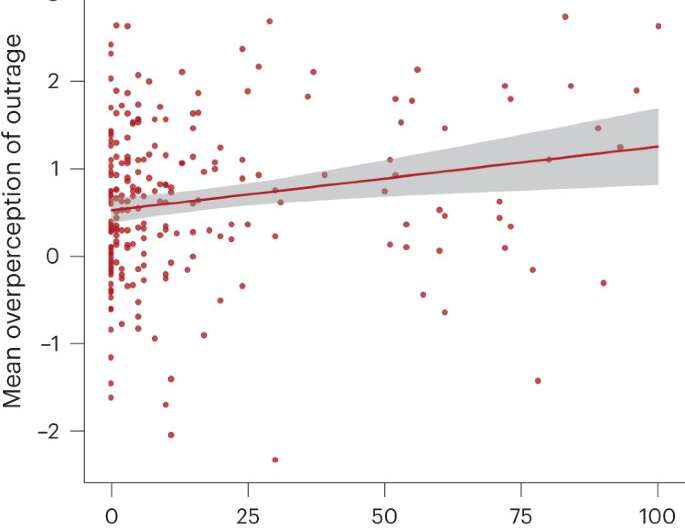This article has been reviewed according to Science X's editorial process and policies. Editors have highlighted the following attributes while ensuring the content's credibility:
fact-checked
peer-reviewed publication
trusted source
proofread
People online might not be as outraged as you think

Many social media users are fed-up with the divisiveness and extremism that they encounter on platforms like Twitter and Facebook. But this kind of content is more pervasive than ever. What explains the mismatch?
The prevalence of moral outrage online can be explained in part by our psychology, according to William Brady, an assistant professor at Northwestern University's Kellogg School of Management.
Brady recently led a new study, published April 10, 2023 in Nature Human Behavior, that explores why people tend to misperceive others as angrier than they really are online. In turn, he says, users tend to engage with triggering content, thereby amplifying it and giving it an algorithmic boost.
So, we see more of it, even though it may be just what we want to avoid.
"You can see why this might be problematic," Brady said. "If we think people are more outraged than they really are, we might think that it's normal, which could lead us to conform to that outlook because we tend to be highly aware of what our social networks are doing."
To test whether and how much people's perceptions of others' anger online differed from what people who posted content were actually feeling, the study took a unique approach that included both observers and posters of content on Twitter.
The authors used machine-learning to identify people who were tweeting about American politics with either high or low levels of outrage. Then, they contacted the tweet authors and asked consenting users to report—within 15 minutes of posting—how happy or outraged they felt when they wrote a particular tweet.
Later, they showed the tweets to 650 other people and asked them to rate how happy or outraged they thought the posters had been.
They found that in general, observers inferred more outrage than was actually present in posters' statements, but estimated happiness more accurately. This reflects a human tendency to pay more attention to—and sometimes overinterpret—negative information, Brady said.
In subsequent related studies, the authors also showed different participants artificial newsfeeds composed of either more outraged or more neutral political tweets, and asked them to rate how outraged they thought the average user of the platform was.
As one might expect, those who saw the more outraged newsfeed inferred that people on Twitter were more outraged in general, and they focused on just a few particularly outrage-filled tweets to come to that conclusion.
Finally, the authors asked a third group who had seen the same newsfeeds to evaluate the appropriateness of new, fake tweets that were either outrage-filled or neutral. Those who had seen more outraged-filled feeds rated outrage-filled posts as more socially appropriate for the platform, hinting at a vicious circle in which more outrageous behavior is seen as normal.
These kinds of interactions can have serious consequences. Brady noted that there's a rising sense of affective polarization in the U.S., which means that political groups increasingly dislike one another. One driver of that is that members of one group tend to think that average members of opposing groups are more extreme than they really are.
But social media isn't—and doesn't need to be—a mere spiral of escalating toxicity. Much of the content we see is already positive: It can be warm, funny or attention-grabbing because it is interesting, rather than provocative.
Brady said that both social media companies and users can play a role in detoxifying the internet.
"If social media companies sought to find and regulate some of the most extreme content, that might not actually harm engagement much, because a lot of that content is pushed by a small minority of users who are the most extreme and most politically active," Brady said.
In the future, algorithms could potentially be redesigned to avoid exploiting our attraction to the most negative content, and users could be educated about how algorithms work through greater transparency.
On the user side, all of us would do well to pause when we are confronted with divisive or inflammatory content and reflect on the fact that it doesn't always accurately represent how the average person in our social network feels, Brady said.
Finally, when in doubt, remember that online spaces—like texting—lack the context, cues and subtleties of in-person conversations. When your dad replies "thanks." or "?." to a thoughtful text, you know that his flatness isn't a sign of coldness; he's just being a dad.
Sometimes, it's worth remembering the same thing about strangers: Ambiguous content does not need to be interpreted negatively as a matter of course.
More information: William Brady, Overperception of moral outrage in online social networks inflates beliefs about intergroup hostility, Nature Human Behaviour (2023). DOI: 10.1038/s41562-023-01582-0. www.nature.com/articles/s41562-023-01582-0
Journal information: Nature Human Behaviour
Provided by Northwestern University




















